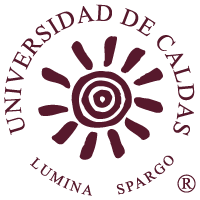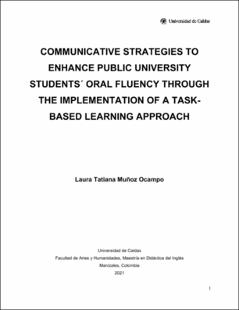| dc.contributor.advisor | Giraldo Martinez, Zoila Liliana | |
| dc.contributor.author | Muñoz Ocampo, Laura Tatiana | |
| dc.date.accessioned | 2022-02-15T13:19:56Z | |
| dc.date.available | 2022-02-15T13:19:56Z | |
| dc.date.issued | 2022-02-14 | |
| dc.identifier.uri | https://repositorio.ucaldas.edu.co/handle/ucaldas/17403 | |
| dc.description | Ilustraciones | spa |
| dc.description.abstract | spa:El propósito de esta investigación acción fue examinar el impacto de la enseñanza de estrategias de comunicación a través de talleres de aprendizaje basado en tareas para mejorar la fluidez en inglés de los estudiantes de la Universidad Nacional de Manizales. Los participantes cursaron esta materia como parte de los requisitos para egresar de sus diferentes carreras. La falta de fluidez se constató como el principal problema de los participantes durante la etapa de diagnóstico. También se identificó que no tenían estrategias para hacer frente a sus limitaciones y que tenían un interés particular en los problemas del mundo real. Como resultado, durante la etapa de acción se diseñaron e implementaron seis talleres de aprendizaje basado en tareas relacionados con el ámbito académico y laboral. Posteriormente, los datos analizados durante la etapa de evaluación surgieron a partir de cuatro instrumentos de recolección de datos: transcripciones de los estudiantes, formulario de autoevaluación del estudiante, formulario de observador no participante y observación del docente. Los hallazgos y conclusiones del estudio sugirieron que los estudiantes mejoraron su fluidez al usar activamente algunas estrategias de comunicación o su articulación para realizar tareas complejas durante los talleres de de aprendizaje basado en tareas. | spa |
| dc.description.abstract | eng:The purpose of the present action research was to examine the impact of teaching communication strategies through Task-based learning workshops to enhance the fluency of English students at Universidad Nacional from the city of Manizales. The participants studied this class as part of the requirements for graduating from their different majors. Lack of fluency was confirmed as the main issue of the participants during the diagnostic stage. It was also identified that they did not have strategies to cope with their limitations and that they had a particular interest in real-world topics. As a result, six TBL workshops related to academic and job environments were designed and implemented during the action stage. Subsequently, the data analyzed during the evaluation stage arose from four data-gathering instruments: students’ transcripts, student’s self-assessment form, non-participant observer form and, teacher’s journal. The findings and conclusions from the study suggested that students improved their fluency by actively using some communication strategies or articulation of them to carry out complex tasks during TBL workshops. | eng |
| dc.description.tableofcontents | CHAPTER I. RESEARCH PROBLEM / 1.1 Rationale / 1.2. Context of the research, setting, and statement of the problema / 1.2.1 Description of the context of research / 1.3 Statement of the problema / 1.4 Research Questions and Objectives / 1.4.1 Research Question / 1.4.2 Pedagogical Objectives / 1.4.2.1 General Objective / 1.4.2.2 Specific Objectives / 1.4.3 Research Objectives / 1.4.3.1 General Objective / 1.4.3.2 Specific Objectives / CHAPTER II. LITERATURE REVIEW / 2.1 Theoretical Framework / 2.1.1 Communication strategies / 2.1.1.1 Compensatory strategies / 2.1.2 Speaking skills/ communication skills / 2.1.2.1 Fluency / 2.1.3 Task-based learning / 2.1.3.1 Definition of task: / 2.1.3.2 Characteristics of tasks: / 2.1.3.3 Tasks design: / 2.1.3.4 Task-based language teaching: / 2.2 Related studies / CHAPTER III. METHODOLOGICAL DESIGN / 3.1 Research approach / 3.2 Participants / 3.3 Instruments and data collection procedures / 3.3.1 Observation / 3.3.2 Interview / 3.3.3 Video recording / 3.3.4 Questionnaire / 3.3.5 Pre-test and Post-test CHAPTER IV. STAGES OF THE STUDY /4.1 Diagnostic stage / 4.2 Action stage / 4.2.1 Workshop 1: Applying for a post-graduate scholarship / 4.2.1.1 Workshop N1 Handouts / 4.2.2 Workshop 2: Making arrangements for a post-graduate scholarship / 4.2.2.1 Workshop N2 Handouts / 4.2.3 Workshop 3: Introducing yourself in an academic/ professional setting /4.2.3.1 Workshop N3 Handouts / 4.2.4 Workshop 4: Online job offers / 4.2.4.1 Workshop N4 handouts / 4.2.5 Workshop 5: Job interview do’s and don’ts / 4.2.5.1 Workshop N5 Handouts / 4.2.6 Workshop 6: Having a job interview / 4.2.6.1 Workshop N6 Handouts / 4.3 Evaluation stage / 4.3.1 Workshops evaluation / 4.3.1.1 Workshop 1 evaluation / 4.3.1.2 Workshop 2 evaluation / 4.3.1.3 Workshop 3 evaluation / 4.3.1.4 Workshop 4 evaluation / 4.3.1.5 Workshop 5 evaluation / 4.3.1.6 Workshop 6 evaluation / 4.3.2 General workshops analysis / 4.3.3 Analysis of Pre and Post-test / CHAPTER V. FINDINGS / 5.1 Findings / Appendices | eng |
| dc.format.mimetype | application/pdf | spa |
| dc.language.iso | eng | spa |
| dc.language.iso | spa | spa |
| dc.title | Communicative strategies to enhance public university students´oral fluency through the implementation of a task-based learning approach | eng |
| dc.type | Trabajo de grado - Maestría | spa |
| dc.contributor.researchgroup | REDI: Researchers in English Didactics (Categoría C) | spa |
| dc.description.degreelevel | Maestría | spa |
| dc.identifier.instname | Universidad de Caldas | spa |
| dc.identifier.reponame | Repositorio Institucional Universidad de Caldas | spa |
| dc.identifier.repourl | https://repositorio.ucaldas.edu.co | spa |
| dc.publisher.faculty | Facultad de Artes y Humanidades | spa |
| dc.publisher.place | Manizales | spa |
| dc.relation.references | Jabbarova, A. (2020). THE ROLE OF COMMUNICATIVE APPROACH IN FOREIGN LANGUAGE. Архив Научных Публикаций JSPI. | spa |
| dc.relation.references | Albino, G. (2017). Improving speaking fluency in a task-based language teaching approach: The case of EFL learners at PUNIV-Cazenga. Sage open, 7(2), 2158244017691077. | spa |
| dc.relation.references | Brown, G., Gillian, B., Brown, G. D., & Yule, G. (1983). Teaching the spoken language (Vol. 2). Cambridge university press. | spa |
| dc.relation.references | Brown, H. D. (2000). Principles of language learning and teaching (Vol. 4). New York: Longman. | spa |
| dc.relation.references | Burns, A. (1999). Collaborative action research for English language teachers. Cambridge: Cambridge University press. | spa |
| dc.relation.references | Burns, A. (1999). Collaborative action research for English language teachers. | spa |
| dc.relation.references | Burns, A. (2009). Doing action research in English language teaching: A guide for practitioners. Routledge. Cambridge: Cambridge University Press. | spa |
| dc.relation.references | Cárdenas, Rosalba, & Miranda, Norbella. (2014). Implementación del Programa Nacional de Bilingüismo en Colombia: un balance intermedio. Educación y Educadores, 17(1), 51-67 | spa |
| dc.relation.references | Carrero Pérez, N. P. (2016). Effects of Tasks on Spoken Interaction and Motivation in English Language Learners. GIST Education and Learning Research Journal, 13, 34-55. | spa |
| dc.relation.references | Chen, X., Zou, D., Xie, H., & Cheng, G. (2021). Twenty Years of Personalized Language Learning. Educational Technology & Society, 24(1), 205-222. | spa |
| dc.relation.references | Creswell, J. W. (2002). Educational research: Planning, conducting, and evaluating quantitative (p. 676). Upper Saddle River, NJ: Prentice Hall. | spa |
| dc.relation.references | Demir, Y., Mutlu, G., & Sisman, Y. S. (2018). Exploring the Oral Communication Strategies Used by Turkish EFL Learners: A Mixed Methods Study. International Journal of Instruction, 11(2), 539-554. | spa |
| dc.relation.references | Dirección Nacional de Programas de Pregrado. Universidad Nacional de Colombia, sede Manizales. 2021. Ficha de asignaturas de Pregrado. Inglés. 2008. | spa |
| dc.relation.references | Donato, R. (2003). Action research. Eric Digest, 3(8). | spa |
| dc.relation.references | Dorendorf, M. (2021). Finding a Balanced Blend: Designing and Supporting Engaging and Effective Integrated Skills Materials for Adult ESL Blended Learning Classrooms. | spa |
| dc.relation.references | Dörnyei, Z. (1995). On the teachability of communication strategies. TESOL quarterly, 29(1), 55-85. | spa |
| dc.relation.references | Elliot, J. (1991). Action research for educational change. McGraw-Hill Education (UK). | spa |
| dc.relation.references | Ellis, R. (2003). Task-based language learning and teaching. Oxford University Press | spa |
| dc.relation.references | Golkova, D., & Hubackova, S. (2014). Productive skills in second language learning. Procedia-Social and Behavioral Sciences, 143, 477-481. | spa |
| dc.relation.references | Gravetter, F. J., & Forzano, L. A. B. (2018). Research methods for the behavioral sciences. Cengage Learning. | spa |
| dc.relation.references | Harmer, J. (1991). The Practice of Language Teaching. Longman. | spa |
| dc.relation.references | Hashemi, M., Azizinezhad, M., & Darvishi, S. (2012). Using task-based language teaching, learning practically in English classes. Procedia-Social and Behavioral Sciences, 31, 526-529. | spa |
| dc.relation.references | Hismanoglu, M., & Hismanoglu, S. (2011). Task-based language teaching: what every EFL teacher should do. Procedia-Social and Behavioral Sciences, 15, 46-52. | spa |
| dc.relation.references | Hopkins, D. (1993). A teacher's guide to classroom research (2nd ed.). Buckingham: Open University Press. | spa |
| dc.relation.references | Lankshear, C. & Knobel, M. (2004). A handbook for teacher research from designing to implementation. New York, NY: McGraw-Hill International. | spa |
| dc.relation.references | Lankshear, C. & Knobel, M. (2006). A handbook for teacher research from design to implementation. New York, NY: Open University Press. | spa |
| dc.relation.references | Lara Velarde, A. C. (2018). Task-based learning and the English speaking skill in students at Universidad Nacional de Chimborazo (Master's thesis, Universidad Técnica de Ambato. Dirección de Posgrado. Maestría en Enseñanza del Idioma Inglés como Lengua Extranjera). | spa |
| dc.relation.references | Liao, G. (2009). Improvement of Speaking Ability through Interrelated Skills. English language teaching, 2(3), 11-14. | spa |
| dc.relation.references | MacArthur, C. A., Graham, S., & Fitzgerald, J. (Eds.), (2008). Handbook of writing research. New York, NY: Guilford Press. | spa |
| dc.relation.references | Mackey, A. & Gass, S. (2012). Research Methods in Second Language Acquisition. Oxford : Blackwell Publishing Ltd. | spa |
| dc.relation.references | Marshall, C., & Rossman, G. B. (2014). Designing qualitative research. Sage publications. | spa |
| dc.relation.references | McIntryre, A. (2008). Participatory Action Research. London: SAGE Publications. | spa |
| dc.relation.references | Merriam, S. B., & Tisdell, E. J. (2015). Qualitative research: A guide to design and implementation. John Wiley & Sons. | spa |
| dc.relation.references | Mertler, C. A. (2008). Action research: Teachers as researchers in the classroom. Sage. | spa |
| dc.relation.references | Munévar Jerez, M. I. (2017). Contextualized worksheets focused on tasks for two oral communication micro-skillls (Doctoral dissertation, Bogotá: Universidad Externado de Colombia, 2017.) | spa |
| dc.relation.references | Namaziandost, E., & Imani, A. (2020). Compensatory Strategies and Iranian Intermediate EFL Learners’ Speaking Fluency: Focusing on Self-Repetition and Comprehension Check Strategies. International Journal of Linguistics, Literature and Translation, 3(3), 107-114. | spa |
| dc.relation.references | Nation, I. S. P. (1991). Fluency and learning. The English Teacher, 20, 1-8. | spa |
| dc.relation.references | Nunan, D. (1989). Designing tasks for the communicative classroom. Cambridge university press. | spa |
| dc.relation.references | Núñez, A., & Téllez, M. F. (2009). ELT materials: The key to fostering effective teaching and learning settings. PROFILE, Issues in Teachers’ Professional Development, 11(2), 171-185 | spa |
| dc.relation.references | Oxford, R. (2001). Integrated Skills in the ESL/EFL Classroom. ERIC Digest. | spa |
| dc.relation.references | Parsons, R., & Brown, K. (2002). Teacher as reflective practitioner and action researcher. Belmont, CA: Wadsworth/Thomson Learning. | spa |
| dc.relation.references | Peña, M., & Onatra, A. (2009). Promoting oral production through the task-based learning approach: A study in a public secondary school in Colombia. Profile Issues in TeachersProfessional Development, 11(2), 11-26. | spa |
| dc.relation.references | Putri, L. A. (2013). Communication Strategies in English as a Second Language (ESL) Context. Advances in Language and Literary Studies, 4(1), 129-133. | spa |
| dc.relation.references | Ricard Hernández, I. D. (2013). Enhancing oral interaction skills in undergraduate students through task-based language learning | spa |
| dc.relation.references | Rodríguez Cervantes, C. A., & Roux Rodríguez, R. (2012). The Use of Communication Strategies in the Beginner EFL Classroom. Gist Education and Learning Research Journal, 6, 111-128. | spa |
| dc.relation.references | Rodríguez-González, E., & Parafita-Couto, M. (2012). Calling for Interdisciplinary Approaches to the Study of "Spanglish" and Its Linguistic Manifestations. Hispania, 95(3), 461-480. | spa |
| dc.relation.references | Rohani, S. (2013). Positive versus negative communication strategies in task-based learning. TEFLIN Journal, 24(2), 158-179. | spa |
| dc.relation.references | Savaşçı, M. (2014). Why are some students reluctant to use L2 in EFL speaking classes? An action research at tertiary level. Procedia-Social and Behavioral Sciences, 116, 2682-2686. | spa |
| dc.relation.references | Skehan, P., & Foster, P. (1997). Task type and task processing conditions as influences on foreign language performance. Language teaching research, 1(3), 185-211. | spa |
| dc.relation.references | Skehan, P., Willis, E. J., & Willis, D. (1996). Second language acquisition research and task-based instruction. Readings in Methodology, 13. | spa |
| dc.relation.references | Su, Y. C. (2007). Students’ changing views and the integrated-skills approach in Taiwan’s EFL college classes. Asia Pacific Education Review, 8(1), 27-40. | spa |
| dc.relation.references | Sukirlan, M. (2014). Teaching communication strategies in an EFL class of tertiary level. Theory and Practice in Language Studies, 4(10), 2033. | spa |
| dc.relation.references | Universidad Nacional de Colombia, sede Manizales. 2021. Disponible en: https://www.manizales.unal.edu.co/menu/ | spa |
| dc.relation.references | Universidad Nacional de Colombia, sede Manizales. 2021. Georreferenciación. Disponible en: dama.manizales.unal.edu.co/index.php/georreferenciacion/ | spa |
| dc.relation.references | Wang, Z. (2014). Developing Accuracy and Fluency in Spoken English of Chinese EFL Learners. English language teaching, 7(2), 110-118. | spa |
| dc.rights.accessrights | info:eu-repo/semantics/openAccess | spa |
| dc.rights.accessrights | info:eu-repo/semantics/openAccess | spa |
| dc.rights.accessrights | info:eu-repo/semantics/openAccess | spa |
| dc.rights.accessrights | info:eu-repo/semantics/openAccess | spa |
| dc.subject.proposal | Communication strategies | eng |
| dc.subject.proposal | Compensatory strategies | eng |
| dc.subject.proposal | Fluency | eng |
| dc.subject.proposal | Aprendizaje basado en tareas | spa |
| dc.subject.proposal | Competencia oral | spa |
| dc.subject.proposal | Estrategias compensatorias | spa |
| dc.subject.proposal | Estrategias comunicativas | spa |
| dc.subject.proposal | Fluidez | spa |
| dc.subject.unesco | Didáctica | |
| dc.subject.unesco | Método de enseñanza | |
| dc.type.coar | http://purl.org/coar/resource_type/c_bdcc | spa |
| dc.type.content | Text | spa |
| dc.type.driver | info:eu-repo/semantics/masterThesis | spa |
| dc.type.version | info:eu-repo/semantics/publishedVersion | spa |
| oaire.version | http://purl.org/coar/version/c_ab4af688f83e57aa | spa |
| oaire.accessrights | http://purl.org/coar/access_right/c_abf2 | spa |
| dc.description.degreename | Magister en Didáctica del Inglés - Manizales | spa |
| dc.publisher.program | Maestría en Didáctica del Inglés - Manizales | spa |
| dc.rights.coar | http://purl.org/coar/access_right/c_abf2 | spa |







